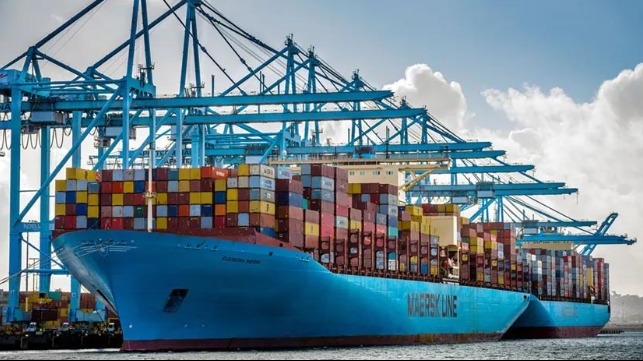Maersk Orders First Methanol-Fueled Containership

Four months after announcing its intention to develop a methanol-fueled containership to accelerate its move toward decarbonization, A.P. Moller - Maersk confirmed that an order has been placed. Calling it the world’s first container vessel fueled by carbon-neutral methanol, Maersk is building a feeder vessel to operate on its Baltic route as a prototype to develop the technology and experience with methanol. It is the latest in a series of companies moving forward with the development of vessels operating on methanol.
The containership, to be operated by Maersk subsidiary Sealand Europe, will be built by Hyundai Mipo Dockyards in South Korea. Maersk’s design calls for a dual-fuel technology permitting the vessel to operate either on methanol or very low sulfur fuel oil (VLSFO). The methanol propulsion configuration will be developed by MAN Energy Solutions and Hyundai Engine and Machinery for the main engine, with a Himsen auxiliary engine developed in collaboration with Hyundai Mipo and Maersk. The vessel is projected to have a top speed of 18 knots.
“This groundbreaking container vessel shows that scalable solutions to properly solve shipping’s emissions challenge are available already today. From 2023 it will give us valuable experience in operating the container vessels of the future while offering a truly carbon neutral product for our many customers who look to us for help to decarbonize their supply chains,” says Henriette Hallberg Thygesen, CEO of Fleet & Strategic Brands, A.P. Moller - Maersk.
Among the details released by Maersk are dimensions of 564 feet in length with a 105-foot beam. Capacity will be 2,100 TEU including 400 reefer units.
"Developing this vessel is a significant challenge, but we have already come a long way in our work with the yard and the makers to reach this milestone,” said Ole Graa Jakobsen, Head of Fleet Technology, A.P. Moller - Maersk. “While we are pioneering these solutions for our industry, we are working with well-proven technologies, and the cost potential from further scaling is becoming very clear to us.”
Expected for delivery by mid-2023, the containership will operate on the Baltic shipping route between Northern Europe and the Bay of Bothnia. American Bureau of Shipping will be the classification society for the vessel which will be registered in Denmark.

that matters most
Get the latest maritime news delivered to your inbox daily.
News of Maersk’s order comes after Proman announced yesterday that it has expanded to six an order for methanol-fueled product tankers being built independently and as part of a collaboration with Stena Bulk. The tankers are being built at the Guangzhou Shipyard International due to enter service in 2022 and 2023. Stena has been operating a RoPax ferry on methanol since 2015.
Many in the maritime industry believe that methanol will be one of the primary future fuel sources for shipping. In a 2020 study, DNV predicted that ammonia and methanol appear to be the two dominant future fuels for deep sea shipping. Similarly, in May of this year, top executives at Wartsila said that they believed methanol-fueled propulsion has strong potential for decarbonizing shipping. They discussed a migration path from the current LNG fuel systems to either methanol or ammonia in the future.
